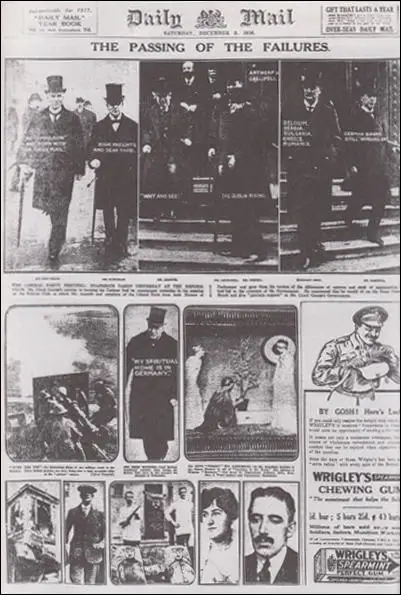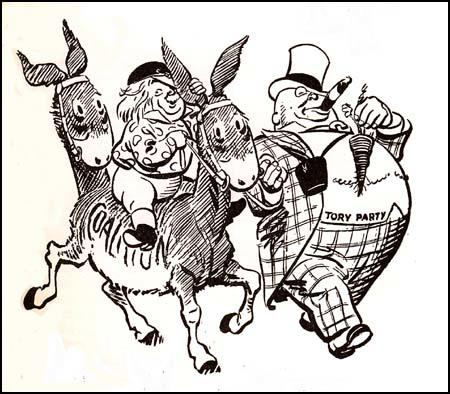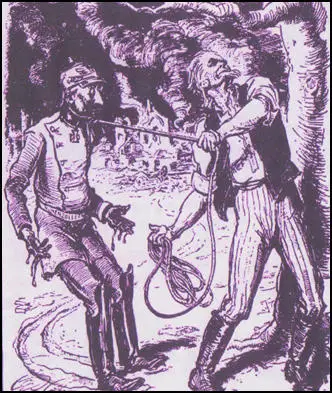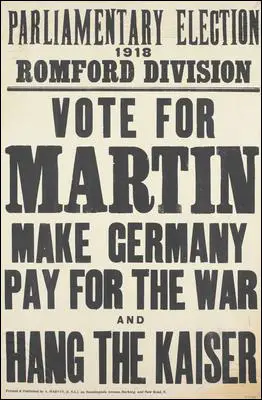1918 General Election
On 4th December, 1916, The Times praised David Lloyd George in his stand against the present "cumbrous methods of directing the war" and urged H. H. Asquith to accept the "alternative scheme" of the small War Council, that he had proposed. The newspaper went on to argue that Asquith should not be a member of the council and instead his qualities were "fitted better... to preserve the unity of the Nation". (1) The Liberal Party supporting Manchester Guardian, referred to the humiliation of Asquith, whose "natural course would be either to resist the demand for a War Council, which would partly supersede him as Premier, or alternatively himself to resign." (2)
Asquith came to the conclusion that Lloyd George had leaked embarrassing details of the conversation he had with him, including the threat of resignation if he did not get what he wanted. That night he sent a note to Lloyd George: "Such productions as the leading article in today's Times, showing the infinite possibilities for misunderstanding and misrepresentation of such an arrangement as we discussed yesterday, make me at least doubtful of its feasibility. Unless the impression is at once corrected that I am being relegated to the position of an irresponsible spectator of the War, I cannot go on." (3)
Lloyd George denied the charge of leaking information but admitted that Lord Northcliffe wanted to "smash" his government. However, he went on to argue that Northcliffe also wanted to hurt him and had to put up with his newspaper's "misrepresentations... for months". He added "Northcliffe would like to make this (the formation of a small War Committee) and any other arrangement under your Premiership impossible... I cannot restrain nor I fear influence Northcliffe." (4)
At a Cabinet meeting the following day, Asquith refused to form a new War Council that did not include him. Lloyd George immediately resigned: "It is with great personal regret that I have come to this conclusion.... Nothing would have induced me to part now except an overwhelming sense that the course of action which has been pursued has put the country - and not merely the country, but throughout the world the principles for which you and I have always stood throughout our political lives - is the greatest peril that has ever overtaken them. As I am fully conscious of the importance of preserving national unity, I propose to give your Government complete support in the vigorous prosecution of the war; but unity without action is nothing but futile carnage, and I cannot be responsible for that." (5)
Conservative Party members of the coalition made it clear that they would no longer be willing to serve under Asquith. At 7 p.m. he drove to Buckingham Palace and tendered his resignation to King George V. Apparently, he told J. H. Thomas, that on "the advice of close friends that it was impossible for Lloyd George to form a Cabinet" and believed that "the King would send for him before the day was out." Thomas replied "I, wanting him to continue, pointed out that this advice was sheer madness." (6)
David Lloyd George removes H. H. Asquith
Asquith, who had been prime minister for over eight years, was replaced by Lloyd George. He brought in a War Cabinet that included only four other members: George Curzon, Alfred Milner, Andrew Bonar Law and Arthur Henderson. There was also the understanding that Arthur Balfour attended when foreign affairs were on the agenda. Lloyd George was therefore the only Liberal Party member in the War Cabinet. Lloyd George wanted Lord Northcliffe to become a member of the War Cabinet, however, Henderson told him that if this happened he would resign and take away the support of the Labour Party from the government. He was now a prisoner of the Conservative Party.
The Daily Chronicle attacked the role that Lord Northcliffe and the other Conservative Party supporting newspaper barons had removed a democratically elected government. It argued that the new government "will have to deal with the Press menace as well as the submarine menace; otherwise Ministries will be subject to tyranny and torture by daily attacks impugning their patriotism and earnestness to win the war." (7)
On 9th December, 1916, The Daily Mail front page, under the headline, "THE PASSING OF THE FAILURES" had a series of photographs showing the outgoing ministers, H. H. Asquith, Edward Grey, Reginald McKenna, Richard Haldane, John Simon and Winston Churchill, with accompanying captions across their chests attacking their records in government. Northcliffe had ordered this feature, and congratulated the newspaper's picture department.

Alfred George Gardiner, the editor of The Daily News, pointed out that David Lloyd George's new government's main advantage was that he had the support of Lord Northcliffe: "It will be subject to a friendly organised and responsible criticism which will aim at sustaining it and not destroying it. The fall of the late Government and most of its failures were due to the absence of such a criticism. It became the target... of a ruthless and uncritical press campaign which appealed directly to the passions of the mob against the authority of Parliament." (8)
Gardiner was right and the Lord Northcliffe press provided Lloyd George with a great deal of support. He was described as a "human dynamo" whose "every erg of energy is focused on the immediate task at hand. He combines the persuasiveness of the Irishman with the concentration of the American and the thoroughness of the Englishman." In another article, written by Northcliffe, stated: "I believe that he will be the head of the Government that wins the war; that brings a settlement of the Irish question and maintains that essential factor goodwill between the people of the English speaking nations of the British Empire and the people of the United States". (9)
1918 Representation of the People Act
In September 1918, David Lloyd George, established a National Election Committee. As a result of the First World War a general election had not been held for over eight years. The passing of the 1918 Representation of the People Act dramatically increased the number of people who could vote. All men over twenty-one now had the vote, previously, property qualifications had barred 40 per cent of them from taking part in elections. "Female householders aged over thirty were also granted the vote, though this left women without property (including most domestic servants) and those in their twenties disenfranchised." (10) These changes almost trebled the size of the electorate. "Two million more men and six million women, five million of them married." (11)
Lloyd George had lost the support of most of the Liberal Party members of the House of Commons. They had followed their leader, H. H. Asquith onto the opposition benches in December, 1916. Lloyd George realised that the only way he could hold on to power would be in a coalition government with the Conservative Party. This idea was appealing to Tory leaders as its members were divided over the issue of tariff reform. (12)
In a letter written in May, 1918, Arthur Bonar Law, explained to Arthur Balfour that "our party, on the old lines, will never have any future in this country". He suggested that unless they accepted Lloyd George's leadership, the general election might destroy the party. Bonar Law went on to argue that Lloyd George would have the same impact on the Conservative Party when Joseph Chamberlain and the Liberal Unionists joined in 1886. Lloyd George "would have the same attitude towards the Conservatives as Joe Chamberlain - with the difference that he would be leader of it (the government)... he brings to his new party fresh blood and extended appeal". (13)
Lloyd George urged the Labour Party to stay in the coalition during the general election. Its leader, Arthur Henderson, rejected the idea. In May 1915, Henderson had become the first member of the party to hold a Cabinet post when Asquith invited him to join his coalition government. However, he resigned in August, 1917, over the issue of peace negotiations. Henderson also wanted to offer the public a clear socialist programme. George Barnes, disagreed with Henderson on this issue and remained as as Minister of Pensions. (14)
By the 8th November, workers councils took power in virtually every major town and city in Germany. This included Bremen, Cologne, Munich, Rostock, Leipzig, Dresden, Frankfurt, Stuttgart and Nuremberg. Theodor Wolff, writing in the Berliner Tageblatt: "News is coming in from all over the country of the progress of the revolution. All the people who made such a show of their loyalty to the Kaiser are lying low. Not one is moving a finger in defence of the monarchy. Everywhere soldiers are quitting the barracks." (15)
The German Social Democratic Party (SDP) in the Reichstag demanded the resignation of Kaiser Wilhem II. When that was refused, they resigned from the German parliament and called for a general strike throughout Germany. In Munich, Kurt Eisner, the leader of the Independent Socialist Party, declared the establishment of the Bavarian Soviet Republic. Later that day, in order to stop the spread of the revolution, the German government agreed to surrender. On 9th November, Kaiser Wilhelm II abdicated and fled to Holland. At 5 a.m. on 11th November, 1918, representatives of the German government signed the armistice. It came into force at 11 a.m. (16)
1918 General Election
David Lloyd George was determined to have a general election as soon as possible. King George V wanted the election to be delayed until the public bitterness towards Germany and the desire for revenge had faded, but Lloyd George insisted on going to the country in the "warm after-glow of victory". It was announced that the 1918 General Election would take place on 12th December. (17)
The First World War had made respectable both government intervention in the economy and public ownership of some essential industries. Alfred Milner described these policies as "war socialism". David Lloyd George believed that this marked a change in the way the economy was organised and wanted to make this one of the main issues of the campaign as he feared the "socialist message" of the Labour Party might be popular with the public. Lloyd George agreed with the left-wing economist, J. A. Hobson, who believed that "The war has advanced state socialism by half a century". (18)

David Lloyd George did a deal with Arthur Bonar Law that the Conservative Party would not stand against Liberal Party members who had supported the coalition government and had voted for him in the Maurice Debate. It was agreed that the Conservatives could then concentrate their efforts on taking on the Labour Party and the official Liberal Party that supported their former leader, H. H. Asquith. The secretary to the Cabinet, Maurice Hankey, commented: "My opinion is that the P.M. is assuming too much the role of a dictator and that he is heading for very serious trouble." (19)
Lloyd George ran a campaign that questioned the patriotism of Labour candidates. This included Arthur Henderson, the leader of the Labour Party who had served in the government as Minister without Portfolio. Henderson's crime was that he did not call for the Kaiser to be hanged and for Germany to pay the full cost of the war. One of his opponents, James Andrew Seddon, the former President of the Trade Union Congress, and now a National Democratic Labour Coalition candidate, commented: "Mr Henderson was very sore because he was being labelled a pacifist. He might not be a pacifist but he had his foot on the slippery slope." (20)

According to Duff Cooper, Lloyd George feared his tactics were not working and he asked the the main newspaper barons, Lord Northcliffe, Lord Rothermere and Lord Beaverbrook, for help in his propaganda campaign. (21) They arranged for candidates to be sent telegrams that demanded: "For the guidance of your constituency will you kindly state whether, if elected, you will support the following: (i) Punishment of the Kaiser (ii); Full payment for the war by Germany (iii); The expulsion from the British isles of all Enemy Aliens." (22)
In every issue of The Daily Mail, Northcliffe he insisted on the hanging of Kaiser Wilhelm II and indemnities from Germany. However, he wrote to George Riddell that he would not use his newspapers and personal influence to "support a new Government elected at the most critical period of the history of the British nations" unless he knew "definitely and in writing" and could approve "the personal constitution of the Government". When Riddell passed along this demand for the names of his prospective ministers to Lloyd George, he replied that he would "give no undertaking as to the constitution of the Government and would not dream of doing such a thing." (23)
Lloyd George told Northcliffe he could "go to hell". One friend remarked: "Each described the other as impossible and intolerable. They were both very tired men and had been getting on one another's nerves for some time." (24) Without the full support of Northcliffe, Lloyd George, arranged for Sir Henry Dalziel and a group of businessmen, who he bribed with the offer of honours and titles, to purchase The Daily Chronicle for £1.6 million. Previously, the newspaper had supported H. H. Asquith and had been highly critical of Lloyd George during the Maurice Debate. The newspaper gave its full support to Lloyd George during the 1918 General Election. (25)

David Lloyd George argued during the campaign that he was the "man who won the war" and he was "going to make Britain a fit country for heroes to live in." Although he told Winston Churchill in private that he was going to urge the execution of the Kaiser he left his fellow candidates to call for him to be hanged. The government minister, Eric Geddes, promised to squeeze Germany "until the pips squeak". In reply to those Labour politicians who called for a fair peace agreement that would prevent further wars, Lloyd George responded by calling them "extreme pacifist Bolsheviks". (26)
The General Election results was a landslide victory for David Lloyd George and the Coalition government: Conservative Party (382); Coalition Liberal (127), National Labour Coalition (4) and Coalition National Democrats (9) . The Labour Party won only 57 seats and lost most of its leaders including Arthur Henderson, Ramsay MacDonald, Philip Snowden, George Lansbury and Fred Jowett. The Liberal Party returned 36 seats and its leader H. H. Asquith was defeated at East Fife. (27)
Political Parties | Total Votes | % | MPs |
|---|---|---|---|
4,003,848 | 38.4 | 382 | |
1,388,784 | 13.0 | 36 | |
2,245,777 | 20.8 | 57 | |
| Coalition Liberal | 1,396,590 | 13.4 | 127 |
497,107 | 4.6 | 73 | |
53,962 | 0.4 | 4 | |
Independent Coalition | 9,274 | 0.1 | 1 |
156,834 | 1.5 | 9 |
Primary Sources
(1) Paul Foot, The Vote (2005)
It was not until November that Asquith, his time as Prime Minister almost exhausted, assured the House that "we shall not proceed with the Bill until after the discussion of the larger questions". This discussion was shuffled off on to another device dreamed up by the Coalition Government in general and by the Local Government Board Minister, the Tory Walter Long, in particular. In August, Long had proposed a "representative conference of earnest men holding strong views, bitterly opposed to each other' which could thrash out a`lasting settlement' for the future of the franchise. This became known as the Speaker's Conference. The Speaker took the chair, and the membership of the committee including of lords, knights and dignitaries from the great and good in the Commons. The original list included such bitter opponents of franchise extension as the Marquis of Salisbury and Sir Frederick Banbury - though
two resigned (presumably in protest at the pro-suffrage balance in committee) on the day of its first meeting, 12 October 1916. The Conference sat 26 times until 26 January 1917, and debated 37 resolutions which 34 were passed unanimously. Not unanimous was a decision to extend the vote to women - though not to all women: for some reason young women were deemed a greater threat to the established order than older women. The Conference was undecided as to the age at which the vote should be extended to women - some thought 30, some thought 35, but no one argued against votes for women in principle.The recommendations of the Speakers' Conference were incorporated in a new Representation of the People Bill, which was brought to the House by the Home Secretary, Sir George Cave, in May 1917. "In the old days," Cave observed, "this measure would have been described as a leap in the dark. Now it excites no emotion whatever." He saw the new Bill as a triumphant vindication of the new spirit of classlessness that had swept the country during the war. "It is impossible to contemplate the revival of the old class feeling which was responsible for the exclusion of so many from the class of electors." As for women, he asked, "is it possible for us having called upon women for so large a contribution to the work of carrying on the war, and having received so splendid a response to that call, to refuse to women a voice in moulding the future of the country?" No, it was not possible, and in spite of a dreary rehearsal of the old arguments against women's suffrage, the Bill got its second reading by a massive majority - 341 to 62. The antis kept up their whining through a long debate in a committee of the whole House, but they had lost the support of most MPs. The Bill rolled through the House of Lords with the grudging support of the Government spokesman there, Lord Curzon, formerly chairman of the Anti-Suffrage League, and on to its royal assent in February 1918. Two million more men and 6 million women, 5 million of them married, were on the electoral register in time for the post-war election in December. Seventeen women stood for Parliament for the first time.
(2) Selina Todd, The People: The Rise and Fall of the Working Class (2014)
In 1918 the Representation of the People Act granted universal male enfranchisement for men aged over twenty-one; previously, property qualifications had barred 40 per cent of them from voting in national elections. Female householders aged over thirty were also granted the vote, though this left women without property (including most domestic servants) and those in their twenties disenfranchised. These were important victories for the labour suffrage movements, won from a government that fearfully hoped for a more stable transition to peace than the revolution and revolt seen in Russia and Germany.
(3) Roy Hattersley, David Lloyd George (2010)
So the ground was prepared for Lloyd George to lead an ecumenical ministry committed to `war socialism' - a term invented by Alfred Milner, who thought of the government's extended role in the economy as comparable to the policies by which Bismarck had reinvigorated Germany.... Whether or not an extension of state power amounts to "socialism" - whatever the qualifying adjective - is the subject of a different book. It is the adjective itself that needs examination. Ignoring it contributed to Lloyd George's downfall. The war had made respectable both government intervention in the economy and public ownership of some essential industries. But in wartime, restrictions on the free economy - like restrictions on personal liberty - are accepted as an unfortunate necessity which should be abandoned whenever peace returns. Bismarck had not impressed either the British trade union movement or British management in the way that he had impressed Lloyd George and Winston Churchill.
(4) Roy Hattersley, Borrowed Time: The Story of Britain Between the Wars (2007)
Inevitably the British general election campaign of 1918 was fought on the parties' rival ideas of post-war reconstruction. The Labour Party (with the exception of George Barnes, one of its nominees in the War Cabinet) withdrew from the coalition after the Armistice and was happily reunited with the pacifists who had refused to support Lloyd George's government. "Our battle cry, above all else," said Jimmy Thomas, the railwaymen's leader, "is No More War." That battle cry became the most popular slogan of the whole campaign. But other, less idealistic, demands were also included in the coalition's speeches. "Make the Germans Pay" and "Hang the Kaiser" were two of the most frequent.The politicians, as politicians often do, chose to identify with the lowest common denominator. F E. Smith, the Attorney General, told the Cabinet that unless the Kaiser was put on trial it would be impossible to indict anyone who was under his command and Eric Geddes, then Secretary of State for War, promised `"to squeeze the German lemon until the pips squeak." Lloyd George could argue that his election pledge was - as befitted a Prime Minister - more measured. But it encouraged the vengeful hope that the reparations made by the vanquished to the victors would be punishment as well as compensation. The Germans, he said, would be required to pay "to the limit of their capacity and we shall scratch their pockets for it". Thus began the process which amounted to competitive bids to determine how great a penalty could be exacted from Germany. The coalition won by a landslide. Lloyd George was committed to imposing severe penalties on Germany. And another step had been taken towards the pauperisation of a nation and the creation of a country so resentful about its treatment that it was prepared to rally behind any rabble-rousing politician who promised to restore national self respect. Lloyd George also became party to the imposition of economic sanctions which were so severe that they precipitated the greatest economic crisis of the twentieth century.
(5) Martin Pugh, Speak for Britain: A New History of the Labour Party (2010)
After the high hopes aroused by the new electorate the outcome of the 1918 election proved to be an anti-climax. Lloyd George fought in alliance with the Conservatives, some Liberals and the NDP to most of whom he and Bonar Law, the Tory Leader, issued a "Coupon" or letter of approval. Although Clynes and, most of the parliamentary party had wanted to remain in the coalition until the peace treaty had been signed, they were overruled by the NEC. When the Armistice was unexpectedly announced in November Lloyd George immediately decided to seek a mandate as "The Man Who Won The War" while his prestige was at its height. Consequently, the election was held while wartime emotions and anti-German hysteria were still high and easily exploited by coalition candidates who freely cast aspersions on the patriotism of their opponents....
Despite its new foreign policy statement Labour entered the Coupon Election virtually as three parties: the anti-war rebels, the belligerent patriots, and the mainstream who attempted to adopt a patriotic but moderate line. opponents of the war were overwhelmingly rejected, MacDonald obtaining only 23 per cent in a straight fight in Leicester West, and Snowden 19 per cent in a three-corned contest at Blackburn. Some Labour candidates publicly repudiated them. When heckled in Birmingham, one speaker protested: "Whatever Ramsay MacDonald and Snowden have been on the war I am not responsible for. Because they are pacifists I can't help that."
Labour's performance is not easy to interpret. The 22 per cent share of the vote undoubtedly marked a breakthrough. The fifty-seven MPs, or sixty-one if independent Labour MPs are included, made Labour the largest Opposition party, since the seventy-three Sinn Fein members refused to attend Westminster and the Asquithian Liberals had only
twenty-eight. Consequently Labour, with some hesitation, occupied the Opposition front bench, a symbolic step towards its new status as the government-in-waiting.
